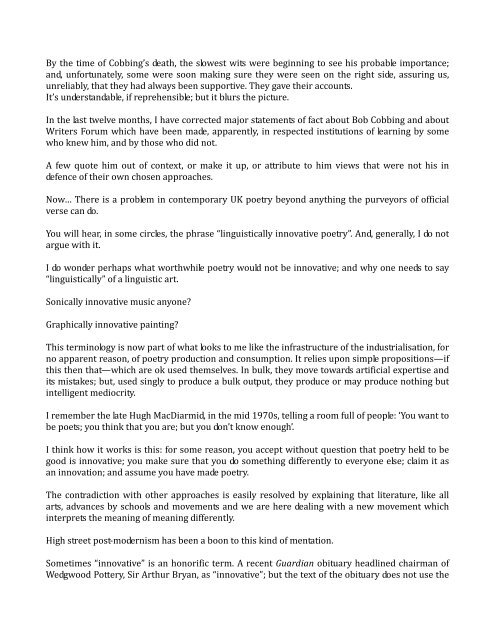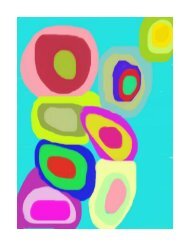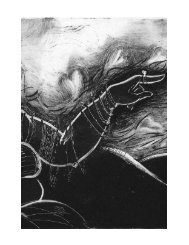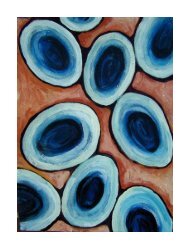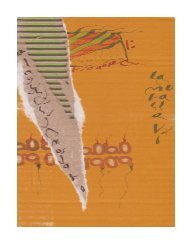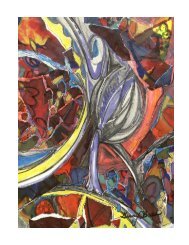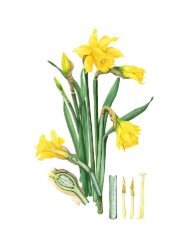Commentaries on Bob Cobbing - The Argotist Online
Commentaries on Bob Cobbing - The Argotist Online
Commentaries on Bob Cobbing - The Argotist Online
You also want an ePaper? Increase the reach of your titles
YUMPU automatically turns print PDFs into web optimized ePapers that Google loves.
By the time of <strong>Cobbing</strong>’s death, the slowest wits were beginning to see his probable importance;<br />
and, unfortunately, some were so<strong>on</strong> making sure they were seen <strong>on</strong> the right side, assuring us,<br />
unreliably, that they had always been supportive. <strong>The</strong>y gave their accounts.<br />
It’s understandable, if reprehensible; but it blurs the picture.<br />
In the last twelve m<strong>on</strong>ths, I have corrected major statements of fact about <strong>Bob</strong> <strong>Cobbing</strong> and about<br />
Writers Forum which have been made, apparently, in respected instituti<strong>on</strong>s of learning by some<br />
who knew him, and by those who did not.<br />
A few quote him out of c<strong>on</strong>text, or make it up, or attribute to him views that were not his in<br />
defence of their own chosen approaches.<br />
Now… <strong>The</strong>re is a problem in c<strong>on</strong>temporary UK poetry bey<strong>on</strong>d anything the purveyors of official<br />
verse can do.<br />
You will hear, in some circles, the phrase “linguistically innovative poetry”. And, generally, I do not<br />
argue with it.<br />
I do w<strong>on</strong>der perhaps what worthwhile poetry would not be innovative; and why <strong>on</strong>e needs to say<br />
“linguistically” of a linguistic art.<br />
S<strong>on</strong>ically innovative music any<strong>on</strong>e?<br />
Graphically innovative painting?<br />
This terminology is now part of what looks to me like the infrastructure of the industrialisati<strong>on</strong>, for<br />
no apparent reas<strong>on</strong>, of poetry producti<strong>on</strong> and c<strong>on</strong>sumpti<strong>on</strong>. It relies up<strong>on</strong> simple propositi<strong>on</strong>s—if<br />
this then that—which are ok used themselves. In bulk, they move towards artificial expertise and<br />
its mistakes; but, used singly to produce a bulk output, they produce or may produce nothing but<br />
intelligent mediocrity.<br />
I remember the late Hugh MacDiarmid, in the mid 1970s, telling a room full of people: ‘You want to<br />
be poets; you think that you are; but you d<strong>on</strong>’t know enough’.<br />
I think how it works is this: for some reas<strong>on</strong>, you accept without questi<strong>on</strong> that poetry held to be<br />
good is innovative; you make sure that you do something differently to every<strong>on</strong>e else; claim it as<br />
an innovati<strong>on</strong>; and assume you have made poetry.<br />
<strong>The</strong> c<strong>on</strong>tradicti<strong>on</strong> with other approaches is easily resolved by explaining that literature, like all<br />
arts, advances by schools and movements and we are here dealing with a new movement which<br />
interprets the meaning of meaning differently.<br />
High street post-modernism has been a bo<strong>on</strong> to this kind of mentati<strong>on</strong>.<br />
Sometimes “innovative” is an h<strong>on</strong>orific term. A recent Guardian obituary headlined chairman of<br />
Wedgwood Pottery, Sir Arthur Bryan, as “innovative”; but the text of the obituary does not use the


